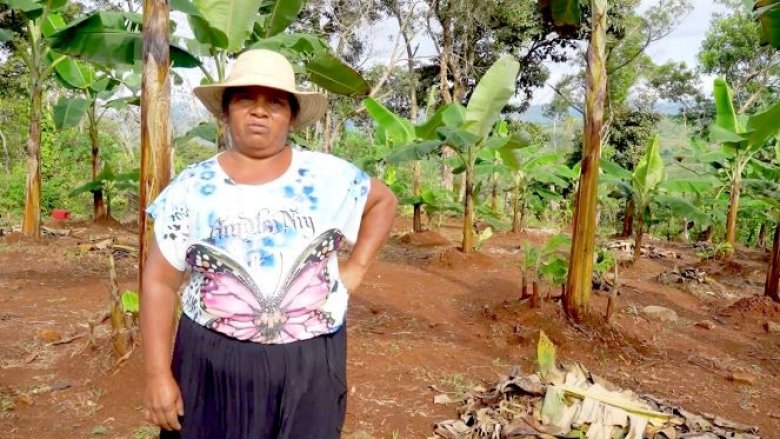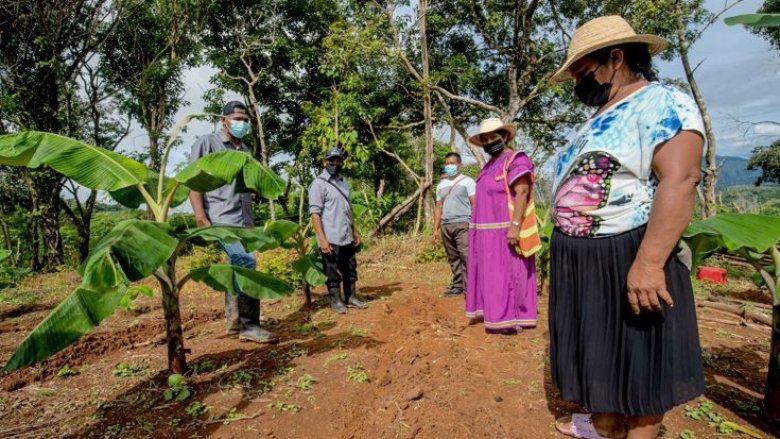Heladia Arcia González is a diligent student. In less than a year, she learned to multiply much more than just numbers: she not only doubled the number of chickens and tubers on her plot in Panama’s Ngäbe-Buglé region, but also was able to reinvest in her business without relying on costly loans thanks to the extra income from the sale of her produce.
Heladia is a student at a farmer field school. Her story is similar to those of 3,000 indigenous women in rural Panama who are acquiring the skills needed to manage the.
The school’s goal is to increase vegetable and poultry production in family plots to produce enough nutritious food and generate additional income throughout the year.
Panama’s indigenous population accounts for over 12 percent of the total population – the country has seven indigenous communities that live mainly in six regions or comarcas. They are historically disadvantaged groups with economic growth challenges given that poverty in those regions affects more than 85 percent of inhabitants.
Indigenous men in Panama earn an average of 57 percent less than non-indigenous men, while women earn some 70 percent less.
However, the most disturbing statistic is that six in 10 children suffer from chronic malnutrition in those regions, which not only impacts their growth but also their ability to learn and their future development.
"I consumed, I sold, I received money and I had an experience that I hadn’t had," says Heladia, speaking of her participation in the Social Cohesion productive inclusion program, which is implemented by the Ministry of Social Development.
Social Cohesion is a cash plus program, that is, it provides support for production that complements other existing assistance. In this case, it was added to the Opportunities Network, a conditional cash transfer program implemented since 2006 in Panama, which gives monthly economic support to mothers whose children attend school and receive regular health check-ups.
Social Cohesion offered Opportunity Network beneficiaries a way to generate autonomous income. The program focused on women from different indigenous communities, who live in the country’s most impoverished areas.
Gaston Mariano Blanco, a senior social protection specialist at the World Bank, says that the main objective of the Social Cohesion program is to improve the food security of families living in extreme poverty in Panama. The program also helps improve the living conditions of those families to increase the human capital of their children.
Farmer field schools
In the farmer field schools, students and their instructors – who are technicians in agriculture– identify problems and solutions to improve crops through hands-on learning. The Food and Agriculture Organization (FAO) has developed the so called farmer field school approach in different countries since the 1980s. These schools are vital for implementing rural productive inclusion projects.
Crucially, instructors speak the language of the community and often form part of it. Although the training is mainly technical, food and nutrition advice is also provided to encourage behavioral change towards healthier diets. For example, the seeds delivered include vegetables, foods that previously were not a local diet staple.
Throughout this training process, women also receive farm tools, seeds, chickens and poultry feed, thereby reinforcing knowledge transfer.
After a year in the program, Heladia increased production on her farm plots: she earned USD 570 from the sale of her surplus yam and plantain production. On previous occasions, she had applied for loans for future crops; this time, however, she invested the money she earned and did not need a loan.
Úrsula Martínez, a social protection specialist at the World Bank, says that a crosscutting approach of the program is "strengthening women through economic empowerment which is achieved by increasing their ability to contribute to the household." Larger harvests and the sale of produce improve their access to economic and financial resources and highlight their role within the community.
Women’s participation in the farmer field schools has also "developed their voice." Initially, they did not speak much in the workshops but have gradually become more expressive and participatory.
The Ministry of Social Development implemented this program in coordination with the FAO, with World Bank financing and technical support. An impact evaluation, which is nearing completion, is expected to generate favorable evidence that will enable the pilot project to be taken to a national scale.


